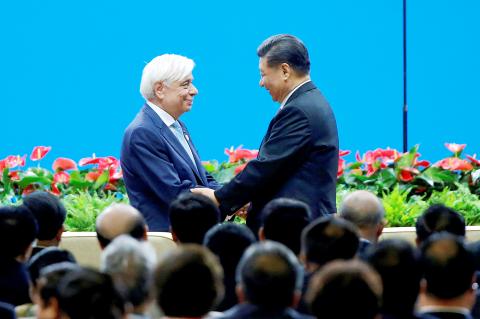Saying there was “no clash” of civilizations, Chinese President Xi Jinping (習近平) yesterday denounced racial supremacy as “stupid” amid tensions with the US and concerns over Beijing’s rising global power.
His remarks came after a top US official last month described the rivalry between China and the US as “a fight with a really different civilization and a different ideology.”
Kiron Skinner, the director of policy planning at the US Department of State, put it in racial terms, telling a security forum that China was the first US “great power competitor that is not Caucasian.”

Photo: Reuters
“Thinking that one’s own race and culture are superior, and insisting on transforming or even replacing other civilizations is stupid in its understanding and disastrous in practice,” Xi said at the opening ceremony of the Conference on Dialogue of Asian Civilizations in Beijing.
It was Xi’s first public address since trade tensions with the US spiked last week. The two nations are locked in an escalating trade dispute, with both levying tariffs on each other’s imports.
Beijing on Monday announced higher tariffs on US$60 billion of US goods, effective on June 1, in retaliation for a US decision on Friday last week to raise levies on US$200 billion of Chinese imports.
Just before Xi spoke, the government reported surprisingly weaker growth in retail sales and industrial output for last month.
Xi made no direct reference to the trade tension, focusing instead on presenting China as a non-threatening country open to all.
China has a glorious history of being open to the world and it would only be more open, Xi said.
Chinese civilization was an “open system” that had continuously had exchanges and learned from other cultures, including Buddhism, Marxism and Islam, he said.
“Today’s China is not only China’s China. It is Asia’s China and the world’s China. China in the future will take on an even more open stance to embrace the world,” he added.
No country could stand alone, Xi said, perhaps taking an indirect swipe at US President Donald Trump’s “America First” policy.
“Civilizations will lose vitality if countries go back to isolation and cut themselves off from the rest of the world,” Xi said.
“The people of Asian countries hope to distance themselves from being closed, and hope that all countries will adhere to the spirit of openness and promote policy communication, connectivity and smooth trade.”
Xi offered no new concrete measures to open China up, aside from proposing an Asia tourism promotion plan, and even on that he gave no details.
Officials have billed the forum as part of a soft power push to put a gentler face on China’s growing might, though it only attracted a handful of foreign leaders to the opening session, at which Xi spoke, including the presidents of Greece, Sri Lanka and Singapore.

Auschwitz survivor Eva Schloss, the stepsister of teenage diarist Anne Frank and a tireless educator about the horrors of the Holocaust, has died. She was 96. The Anne Frank Trust UK, of which Schloss was honorary president, said she died on Saturday in London, where she lived. Britain’s King Charles III said he was “privileged and proud” to have known Schloss, who cofounded the charitable trust to help young people challenge prejudice. “The horrors that she endured as a young woman are impossible to comprehend and yet she devoted the rest of her life to overcoming hatred and prejudice, promoting kindness, courage, understanding

‘DISRESPECTFUL’: Katie Miller, the wife of Trump’s most influential adviser, drew ire by posting an image of Greenland in the colors of the US flag, captioning it ‘SOON’ US President Donald Trump on Sunday doubled down on his claim that Greenland should become part of the US, despite calls by the Danish prime minister to stop “threatening” the territory. Washington’s military intervention in Venezuela has reignited fears for Greenland, which Trump has repeatedly said he wants to annex, given its strategic location in the arctic. While aboard Air Force One en route to Washington, Trump reiterated the goal. “We need Greenland from the standpoint of national security, and Denmark is not going to be able to do it,” he said in response to a reporter’s question. “We’ll worry about Greenland in

PERILOUS JOURNEY: Over just a matter of days last month, about 1,600 Afghans who were at risk of perishing due to the cold weather were rescued in the mountains Habibullah set off from his home in western Afghanistan determined to find work in Iran, only for the 15-year-old to freeze to death while walking across the mountainous frontier. “He was forced to go, to bring food for the family,” his mother, Mah Jan, said at her mud home in Ghunjan village. “We have no food to eat, we have no clothes to wear. The house in which I live has no electricity, no water. I have no proper window, nothing to burn for heating,” she added, clutching a photograph of her son. Habibullah was one of at least 18 migrants who died

Russia early yesterday bombarded Ukraine, killing two people in the Kyiv region, authorities said on the eve of a diplomatic summit in France. A nationwide siren was issued just after midnight, while Ukraine’s military said air defenses were operating in several places. In the capital, a private medical facility caught fire as a result of the Russian strikes, killing one person and wounding three others, the State Emergency Service of Kyiv said. It released images of rescuers removing people on stretchers from a gutted building. Another pre-dawn attack on the neighboring city of Fastiv killed one man in his 70s, Kyiv Governor Mykola